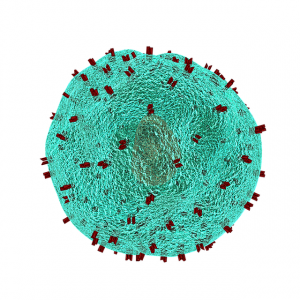Selenium is one of the micronutrients known to have an important and specific impact on immune system activity.

In a 2022 review, Munteanu and Schwartz summarize the relevant research data on the modulation of immune function by micronutrients, including selenium and zinc [Munteanu 2022].
For selenium, the authors find the following evidence of a beneficial effect of selenium on immune system function:
- Selenium, as a component of the amino acid selenocysteine, improves the synthesis of inflammatory mediators.
- Selenium treatment leads to a decline in the gene expression of the pro-inflammatory cytokines IL-1 and TNF-alpha. This indicates that selenium has an anti-inflammatory effect in the body.
- Selenium enhances the immune response of T-cells and T-helper 1 cells. T-cells work to destroy cells that have been infected by bacteria or viruses. Th1 cells are also responsible for fighting against bacteria and viruses.
- Selenium supplementation increases the concentration of antibodies that enhance vaccine effects.
- Selenium acts as a co-factor in the immunity that is mediated by the influenza vaccine. Selenium also serves as a co-factor to achieve a more effective immune response to COVID vaccination.
- Selenium contributes to the defense against bacterial and vital pathogens through its effects on redox signaling activities.
- -Selenium supplementation of patients with cancer increases antibody concentrations of the immunoglobulins IgA and IgG as well as increases the number of neutrophils.
Selenium – A Crucial Micronutrient for a Functional Immune System
Munteanu & Schwartz [2022] make the following additional points about an adequate supply of selenium:
- Selenium improves not only in the functioning of the immune system but also the functioning of thyroid metabolism and the functioning of the cardiovascular system.
- Selenium may play a role in the prevention of some forms of cancers.
Selenium and COVID-19
Munteanu & Schwartz [2022] report that selenium together with zinc exerts a protective role in COVID-19 patients. The combination of selenium and zinc is associated with a higher chance of survival.
Moreover, Munteanu & Schwartz [2022] claim that the selenium administration strengthens the response to vaccination against COVID-19. Similarly, selenium administration increases the concentration of antibodies against COVID-19. Thus, selenium may act as a co-factor in immunity response that is mediated by the COVID-19 vaccine.
Selenium and Polycystic Ovary Syndrome
In women who are infertile as a result of polycystic ovary syndrome and who are undergoing fertilization in vitro, selenium treatment decreases the extent of gene expression of the cytokines IL-1 and TNF-αlpha.
Selenium and Cancer
In patients with cancer, selenium supplementation increases the concentrations of immunoglobulins IgA and IgG as well as increases the number of neutrophils. In this way, selenium is involved in the regulation of the synthesis of inflammatory mediators.
In addition, selenium may be involved in an increase in the activity of phagocytic cells. Selenium is able to enhance the immune response of Th1 cells and the stimulation of T-cells. Selenium status has a positive association with the number of B cells.
Selenium and the Brain
In the brain, selenium infusion has been associated with the formation of new neurons in the brain (neurogenesis) and with increases in hippocampal neural precursor cells [Munteanu 2022].
Conclusion: Selenium Benefits Immune Function
Munteanu & Schwartz list the following beneficial effects of adequate selenium status on immune function:
- improves production of inflammatory mediators
- enhances vaccine effects
- stimulates immune response of T-cells and T-helper cells
- acts as an anti-inflammatory agent
The best evidence of adequate selenium status indicates that serum/plasma selenium concentrations should be around 125 mcg/L [Winther 2020, Figure 3].
Sources
Munteanu C, Schwartz B. The relationship between nutrition and the immune system. Front Nutr. 2022 Dec 8;9:1082500.
Winther KH, Rayman MP, Bonnema SJ, Hegedüs L. Selenium in thyroid disorders – essential knowledge for clinicians. Nat Rev Endocrinol. 2020 Mar;16(3):165-176.
The information presented in this review article is not intended as medical advice and should not be used as such.
15 January 2023
